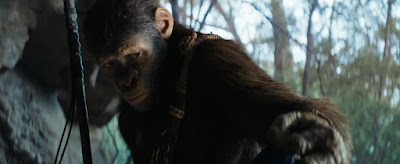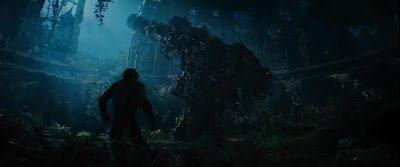or
"Decency. Morality. Strength. Compassion."
"It's all in the eyes, isn't it?"
Laurence Olivier
Caesar is dead. Long live Caesar.
The new entry of the re-booted "Planet of the Apes" series continues with a fourth one, titled Kingdom of the Planet of the Apes. Taking place "many generations later" than the previous one, we're introduced to an entirely new set of characters and circumstances as Earth starts to adjust to the population upheavals of "The Simian Virus" (we've been told that only 1 in 500 humans were immune to the deadly virus, which came from developing a cure for Alzheimer's*). It has become apparent that the re-boot series has a slightly more ironic demise for mankind, choosing Good Intentions over Nuclear Stupidity.
Another difference from the original series is that this time around (or in this Universe, if you want to get all science-fiction-y about it) the Apes filled a void left by Mankind's decimation. In the Apes series 1.0, another virus killed all dogs and cats, and apes became their replacements-and mankind being unkind-found them handy as slaves. All it took was the progeny of a time-traveling future ape couple to light the spark of revolution.**
Up to this point, the reboot series has been pretty binary...it was only apes and humans. The occasional horse, of course (of course), but the Planet of the Apes has, of late, been a poor example of bio-diversity. Kingdom changes that. Our first shot is of an eagle swooping down and snagging a fish out of a lake. And before anyone can suspect they're seeing a Planet of the Eagles movie, it swoops onto the waiting arm of an ape, just like Grub-hub. We are in the midst of the Eagle Clan, who have a neat little system of farming and hunting, while letting the eagles do the work. Not much conflict there, but it's a thriving self-sustaining community.
But, getting down to particulars, we then follow a trio of apes on a mission. Noa (Owen Teague), Anaya (Travis Jeffery), and Soona (Lydia Peckham) are climbing their way up the sides of dilapidated skyscrapers hunting for unhatched eagle eggs. The next day is bonding day where they will be paired with their eagle hatchlings that will join them in the hunting/gathering expected of them. And it's the way of the Eagle Clan to claim an egg—leaving one in the nest for the perpetuation of the species in the wild—fighting off dizzying heights and outraged eagles to find that one egg that "sings to you."
All well and good, despite some complications. These chimpanzees are basically young adults, and they spook easily, given the stories told to them from their forefathers, particularly of creatures they call "Echoes" that (legend has it) live beyond the tunnel kilometers away from the village. Plus, they've been having trouble with "scavengers" who have been stealing crops and helping themselves to the fish in the smoke-house. Noa has a night-time confrontation with one, and in the struggle, his eagle egg gets crushed, and despite warnings from friends and his parents, he decides to make a last-minute excursion to get another egg before the ceremony starts.
And it's here that I have to stop any synopsis because the spoilers start coming pretty fast and loose 20 minutes into the movie. Things get complicated—in the way it's happened in quite a few Westerns—and Noa must go on a hero's quest that pretty much follows the Joseph Campbell playbook of the noble cause mixed with the righting of wrongs. At the same time, there are "echoes" of the past films that any history with the series, past or present, will recognize.***
How is it? Really good, in the way the previous three re-boot films have been very good (as opposed to Apes 1.0 that was a series of diminishing returns). And—as critic Glenn Kenney used the term in his review of Rise of the Planet of the Apes—it delivers a couple of genuine "Holy Shit!" moments. The art design is really impressive, showing a United States—specifically—that Nature has taken over. A couple apes will be riding horses in the foreground, and when they move enough that you can see where they've been, you goggle "Ohmigod! That's an airport!" (I had the same reaction to some of the scenes in Civil War recently). There's a nice depth to the imagining of an ape civilization done by the WETA wizards that says a lot about the society by the junk it keeps...and values. And the writers provide wonders a-plenty that you just know in your gut are going to be used as sequel fodder—they "sing to you."And the acting in these things are always better than they have a right to be, given the obfuscation of masks or CGI face-grids, and Kingdom has a lot of talent on display despite the fact that you never see their faces and you wouldn't recognize them if you passed them on the street. There's something about their choice of how an ape will sound speaking English that's fun to experience. One of the actors (Kevin Durand), playing a populist-leader-with-eyes-towards-dictatorship does a lovely spin that sounds remarkably like James Earl Jones.
But, like Olivier said, "it's all in the eyes, isn't it?" Despite the overlay of CG, the expressions in the eyes always shine through, making a connection with audiences whatever the mood they're conveying. And given the encumbrances of the motion-capture suits the actors are forced to wear, that it all comes off seamlessly, and one just gets used to seeing the apes as characters, like any other biped. One becomes fascinated with the macro and the micro of the ape
It's quite extraordinary, really. And there are just enough threads for future stories that one wants to see what will evolve in future installments, keeping in mind that there is still a spaceship out there "lost in space" (that the San Francisco Chronicle paper headlined) on its way to Mars. Like the way-laid mission from the 1968 film, that ship should be coming down sometime—it was called "Icarus" after all. And one wonders what those astronauts will find when they get there.
It's quite extraordinary, really. And there are just enough threads for future stories that one wants to see what will evolve in future installments, keeping in mind that there is still a spaceship out there "lost in space" (that the San Francisco Chronicle paper headlined) on its way to Mars. Like the way-laid mission from the 1968 film, that ship should be coming down sometime—it was called "Icarus" after all. And one wonders what those astronauts will find when they get there.
Will ape and human be able to get along and co-exist peacefully? Will those astronauts find a better society than the one they left? The indications in Kingdom of the Planet of the Apes points to a negative answer. But the question is still intriguing.
* The development of this cure also radically increased the intelligence of our genetic first cousins...apes. Hence, their rapid rise in the food-chain.
** And talk about irony: those apes came to 1970's Earth using Charlton Heston's spaceship from the original movie, the one that took him to the future planet of the apes in the first place. You want to blame somebody for the planet going topsy turvy? Blame Heston!












No comments:
Post a Comment